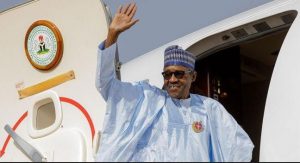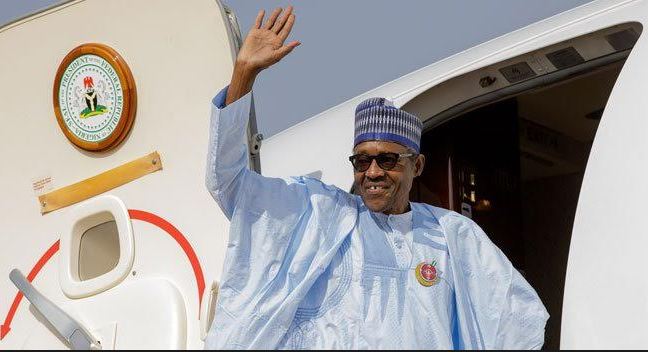Where is Buhari in London.
Seven days into President Muhammadu Buhari’s 10-day private visit to the United Kingdom with no public appearance of the president in Britain save for his arrival into the country in the late hours of April 25, has revived raging debates over concerns and secrecy of the president’s state of health.
For nearly 170 hours in a foreign land, the president has not been seen nor heard from. As stated in the announcement by the presidential spokesman, Femi Adesina, who termed the holiday a private visit, everything about Buhari’s trip since arriving Britain at about 11:30p.m. last week Thursday, has been shrouded in utmost secrecy. “He is expected to return to Nigeria on May 5,” Adesina said, giving no further details.

Abuja House, the president’s choice destination in London, has been devoid of its usual buzz whenever Buhari is around, signifying that the president has opted for another location for his private visit.
Also significantly absent during this visit is the customary pilgrimage of Very Important Personalities (VIPs) and high-ranking government officials to London to see Buhari for photo-ops. Same is the reception hosted for the president’s long-time friends like the Archbishop of Canterbury, Justin Welby.
Likewise, UK’s media is unconcerned about the presence of a foreign head of government in their country. The Guardian checks in Britain’s top dailies turned up nothing about the president’s visit. The only reports that featured Nigeria in The Daily Telegraph, The Sun, Daily Mail, Daily Star, Daily Express and The Times were on the recent murder of the British aid worker, Faye Mooney, in Kajuru, Kaduna and visit of celebrated supermodel, Naomi Campbell to Lagos for a fashion event.
The 76-year-old president has previously been in London for long spells of medical care. From May 2016 until mid-2017, Buhari was in London for medical treatment for increasingly long periods of time, forcing government denials that he was gravely ill or even dead.
By the time of his expected return on May 5, he would have barely three weeks left to the end of his first term in office, which has seen him spent a total of 409 days – a year and 44 days – (and still counting) travelling to 33 countries in four years of his first term in office. He has spent so far 224 days in the United Kingdom, the country he visited the most, mostly on health grounds and meetings of Commonwealth Heads of State and Government.
To date, he has not disclosed details about his condition, apart from saying he had “never been so ill” and had to undergo multiple blood transfusions. His health status was an issue in the campaign for the February 23 presidential elections, with the opposition’s Peoples Democratic Party (PDP) insisting he was physically unfit to govern.
The retired general, who was first elected in 2015, is scheduled to be sworn in for a second four-year term on May 29, though the PDP’s presidential candidate and main challenger, Atiku Abubakar, has lodged a legal challenge to the election results.
All these have gone to institutionalise one of the legacies of the present administration, which is the Buhari secrecy. The secrecy surrounding an individual’s health condition is a pervasive cultural practice in most African societies. Such secrecy is exemplified by the illness and death of monarchs, which are typically wrapped in secrecy until appropriate rituals of purification had been performed. Even then, the monarch’s subjects are never told about the ailment to which their monarch succumbed.
In the case of President Buhari, however, such secrecy has attracted much controversy for various reasons, including the bitter experience with the late President Umaru Yar’Adua, whose ailment was kept secret until he was rumoured to have died in a foreign hospital. The cloak of secrecy around Buhari’s health creates a shift from the norm in Western democracy, where the government’s business is the people’s business.
Even more importantly, secrecy is abhorred, having given way to transparency and accountability as guiding principles of information management. These principles are further enhanced by the constitution and the Freedom of Information Act, which empowers the people to know what is going on, not only with the government’s business but also with the business managers, including the president.
This trip, dubbed private visit, is an extension of the president’s legacy of secrecy. The president and Commander-in-Chief of the armed forces is not a private or ordinary citizen. The day he decides to contest for the office and gets elected, he ceases to be a private citizen. He becomes a public citizen, owned by the people who elected him into office. He no longer has a private life.
•Text (excluding headline) excerpted from a Guardian report.
